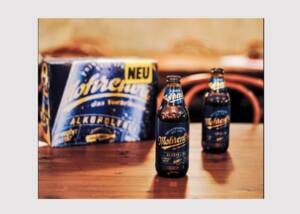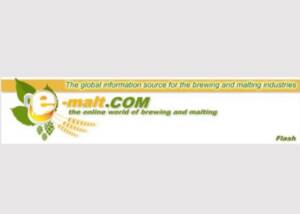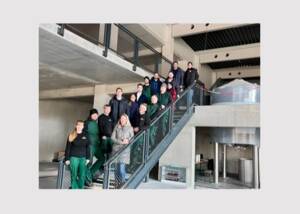"A very difficult decision, but one that can now no longer be postponed"
News General news
Radeberger Gruppe adjusts its lineup to long-term market developments: Frankfurt production and bottling site to be phased out - brands to be retained - volumes to be relocated

It was a decision which those responsible did not take lightly, but to which there was now no alternative in the light of the stacking crises, the resulting unprecedented cost explosions, and long-term market developments: the Radeberger Gruppe will shut down production and bottling operations at its Frankfurt site, i.e. the Binding brewery, by October 2023 at the latest, and will gradually transfer the brands and volumes produced and bottled there to sister sites. In this way, the market leader in the German beer market is anticipating a beer market that will continue to decline in the long term as a result of structural changes, but above all will also come under severe pressure from the long shadows of the crises, is actively removing overcapacities from the market that are placing a heavy economic burden on it, and is thus ensuring optimized capacity utilization and strengthening of its brewing sites in all regions of Germany.
"We have long struggled to maintain the Frankfurt Binding brewery as an emotionally special location for all of us: Thus, we have explored all alternative approaches and routes, used room for maneuver and thus also accepted economic disadvantages for years with the aim of not having to make this difficult decision. Against the backdrop of the recent crises, the massive burdens facing German brewers, and not least the dramatic cost explosions that we as an industry have to shoulder, this is now unfortunately no longer feasible for the group of companies," Guido Mockel, spokesman for the management of the Radeberger Gruppe, describes the background.
Additional burdens in the three-digit million range
The industry has not yet come close to recovering from the consequences of the pandemic and is now already groaning under what are probably the most dramatic cost increases since the end of the Second World War. "In our group of companies alone, these burdens already amount to an additional three-digit million euro sum as things stand at present, with the trend continuing to rise. A sum that can no longer be cushioned by efficiency improvements alone," says the brewery boss.
For precisely this reason, the group had already announced at the beginning of September that it would have to make moderate adjustments to its selling prices from December 1, 2022. However, this is not enough to counteract current market and cost developments in the long term: "We are working in a very price-sensitive market environment in which price adjustments can only be made with a sense of proportion. Therefore, after carefully exploring all alternative approaches, we must now also work on our fixed and operating costs - in other words, reduce uncertainties in our positioning, for example, due to brewing and filling capacities that are not being optimally utilized," says Mockel.
The group is now addressing this challenge with the announced shutdown of the Binding brewery in 2023: "On the one hand, there is considerable overcapacity here at the Frankfurt production site itself, which in the past we have only been able to continue to utilize to capacity with great entrepreneurial and economic effort. On the other hand, our goal was to respond to this Group-wide challenge in one step, at one location," explains the company spokesman.
Corporate headquarters to remain in Frankfurt - brands to be continued
The Radeberger Group's headquarters in Frankfurt is expressly not affected by this measure; it will continue to be based at Sachsenhäuser Berg. The brands and quantities brewed and bottled by the Binding brewery will also be maintained beyond the end of the Frankfurt production site according to proven recipes.
Socially acceptable solutions
The Group has already informed its workforce about the decision and further plans: "We know that this will hit our colleagues at the Binding brewery hard. That's why we've done a lot of looping in previous years and implemented measures to avoid this site closure. However, in the interests of our remaining 6,800 employees, we must now take this step consistently, however difficult it may be for us," emphasizes Guido Mockel. "Thus, this measure at one site serves to sustainably strengthen other sites."
For the 150 or so employees affected, the Radeberger Gruppe will seek socially acceptable solutions wherever possible in the talks with employee representatives that are now getting underway. These could include, for example, partial retirement offers or alternative job offers at its other sites.
Sustainably fit for market development
With this step, the Radeberger Gruppe is positioning itself for long-term market development, which has been dramatically accelerated by the last two and a half years in crisis mode: The German beer market, for example, has already been in decline for many years. Since the beginning of this millennium, it has lost nearly 25 million hectoliters of sales, while the industry has made only marginal capacity adjustments. "As a result of the Corona pandemic alone, our brewing industry has lost almost seven million hectoliters of beer sales in just two years: a volume that would probably only have been lost in the next seven to ten years if the market had developed as it did. This is a real sales trauma for the brewers," explains Mockel. As a result, the German brewing industry is now suffering more than ever from unhealthy overcapacity, which is increasingly standing in the way of sustainable business.
"Brewing and filling capacities that are not optimally utilized produce one thing first and foremost: avoidable costs. And to a considerable extent," Guido Mockel describes the burdensome situation for German breweries. "What is true for the industry is equally true for us as the market leader: in our group of companies, too, significant overcapacities have accumulated over the years as a result of market changes, shifts in demand, or quite simply historically grown oversizing of the brewing and filling plants at some sites, which we can now no longer leave untouched in the light of crises and economic challenges in order to be able to continue to act powerfully in the market and shape it in the future," says Mockel. "That's what we're competing for. But that also requires this consistency right now."
Germany's largest private brewery group, which continues to have 13 beer sites throughout Germany and its mineral springs in Löhnberg, will continue to be managed from the Main metropolis. Around 380 employees at the Frankfurt headquarters will ensure centralized management of the group's numerous national and regional commitments in the beer and beverage market. The group has more than 80 brands in its wide-ranging portfolio, is Germany's largest keg beer marketer, and also powerfully shapes its industry as a leading beverage logistics provider and operator of specialty beverage stores.










